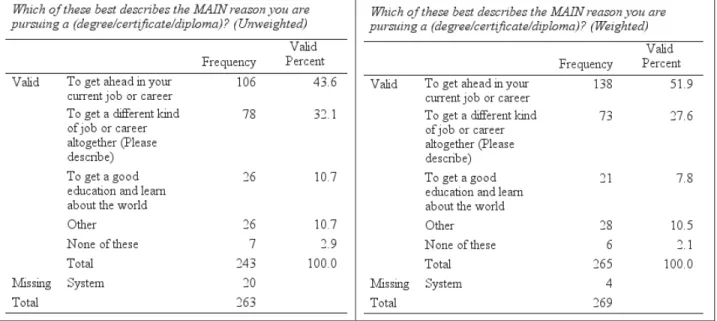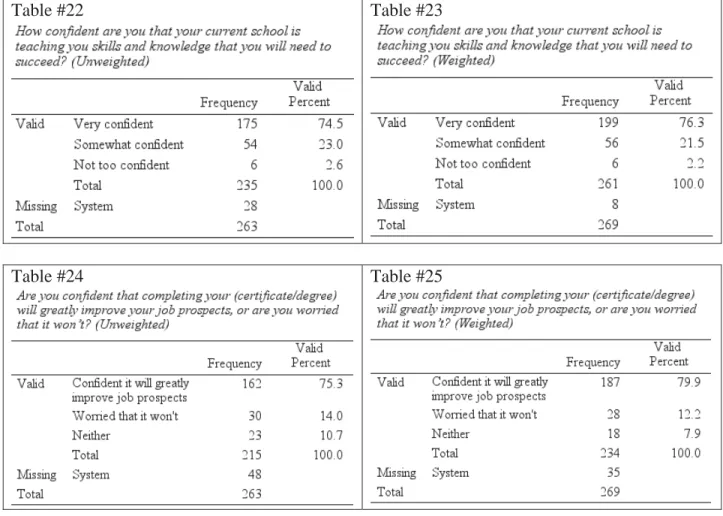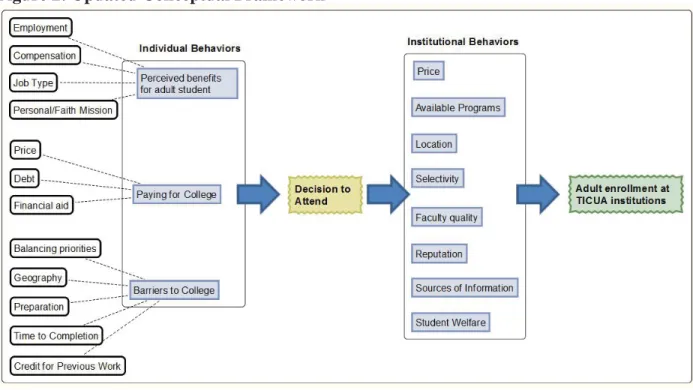Survey.To gain insight into the selection process for adult college students, our capstone study surveyed students across seven TICUA member institutions that agreed to participate in the study. An additional three TICUA member institutions participated in our interviews with adult students and TICUA institution staff members. In total, we estimate 2879 mature students across seven TICUA member institutions received a request to participate in our capstone survey.
Our adult student interview participants for the study were 10 current, adult students from three TICUA member institutions.
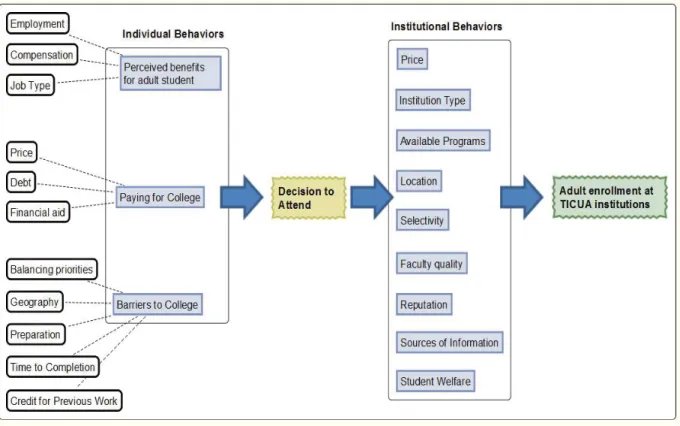
Representatives from interested TICUA member institutions were asked to disseminate information about our project to their adult student population. Enrollment experiences were not described in the same way by adult students or TICUA member campus staff. Several members of TICUA campus staff and administrators mentioned the orientation's role in helping older students.
TICUA member campus staff and administrators pointed out several places where adult students could go for help.
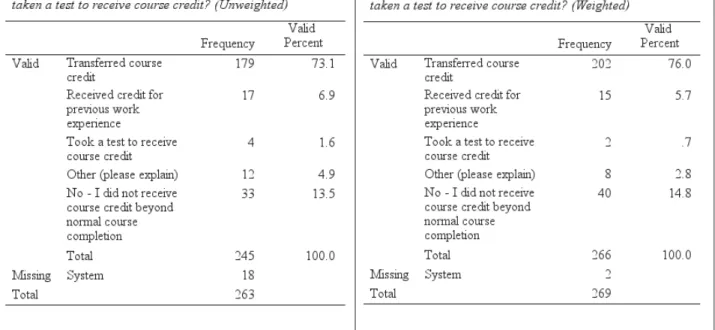
Most of the mature students interviewed noted the importance of efficiency through transfer credit awards. An initial theme that emerged from the interviews was the perceptions of higher education's value among TICUA member campus staff and administrators and mature students in relation to their respective TICUA member campus. Mature students also shared that support staff working in enrollment played a role in the matching process.
Other adult students expressed a similar sense of satisfaction with their choice, despite their perception of the price.
Other ways that institutions can communicate their commitment to the well-being of adult students include how academic advising and academic programming are offered to adult students. In interactions at their institutions, adult students find that classroom interactions are positively related to adult student experience and retention (Ashar & Skenes, 1993; Kerka, 1995). Because of limited social connections with classmates, relationships with faculty connect adult students to the classroom.
According to Feldman et al. 1999), students need to clearly see that institutional goals and objectives prioritize serving adult students well.
Staff and student interview groups described extrinsic motivators for adult students to enroll in college. Another extrinsic motivator described by TICUA campus members, staff, administrators, and adult students is industry-applicable skills. Another intrinsic motivator described by TICUA campus members, staff, administrators, and adult students is finally getting a degree.
The interview themes explored in RQ4 findings are related to perceived benefits for adult students under the individual behaviors in our conceptual framework.
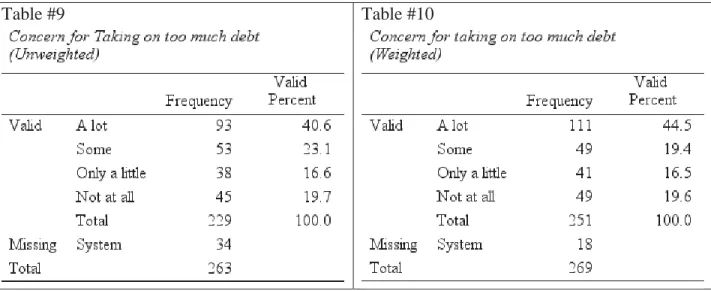
The last area of evaluation concerned the work and career-related skills learned by adult students. The theme previously described in RQ1 findings emerged from interviews with adult students and staff at TICUA. This theme explores the nature and quality of interactions between TICUA member institutions, various institutional representatives and adult students.
Another theme that was previously described in the RQ2 findings, which emerged from the interviews with adult students and staff at TICUA, was .. the perception of the value of higher education.
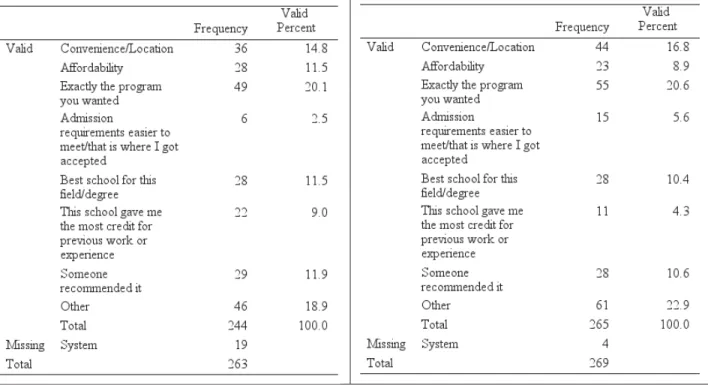
Survey questions on adult student perceptions of remedial assignments sought to examine these concerns among TICUA adult students. A strong theme that emerged in interviews with campus staff, TICUA members, administrators, and adult students concerned balance. TICUA member campus staff, administrators, and adult students have repeatedly shared elements of balance that concern adult students.
TICUA member campus staff and administrators also noted challenges with balancing work and school that they believe mature students face. Our student survey findings show that a major source of information in the college selection process for mature students is the institution's website. The brevity of the adult student college search process coupled with being the primary source of information for prospective adult college students demonstrates the need for a user-friendly, informative institutional website with tailored information for adult students.
A pattern from our student survey and interviews with mature students and TICUA member campus staff shows that one of the most common best practices among TICUA institutions for recruiting and retaining mature students is credit for previous work. Based on interviews with TICUA member campus administrators and staff, and from review of the literature, there are some key considerations for institutions to offer degree programs to mature students. First, according to TICUA member employees, the demand from mature students for degree offerings and degree completion opportunities is compelling for institutions of higher education.
Many of the adult students in our sample were attracted to such values and cited them as their primary reason for enrollment. These are specific ways in which faculty can respond to the needs of adult students.
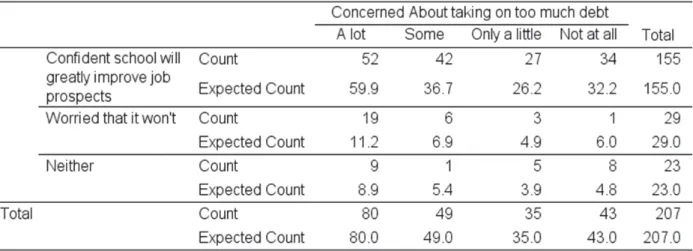
Once students are enrolled, student well-being and faculty quality are top priorities in supporting adult student success. These policies, procedures, and academic programs can either operate to meet the needs of adult students and provide the flexibility needed by the adult student population, or institutional practices can operate in a more "one size fits all" model that does not account for unique characteristics. adult students How and when institutions that offer academic programs, services, and support resources affect how accessible it is to enroll in college and complete a degree for adult students.
Not providing classes and university services at times convenient for adult students is a critical barrier to adult students enrolling in a college or university. To positively impact student achievement, institutions serving mature students need to be mindful of how congruent or incongruent their policies, procedures and environment are for mature student support and services. other. These mature student/faculty relationships should be considered important to understanding the experience of mature college students.
In interviews with both mature students and TICUA institution staff, participants described mature students choosing to enroll in college for external rewards, such as career development and advancement considerations. Another notable item for discussion from the student survey, and adult student and TICUA campus staff interviews is the role of support in the lives of adult students. The role of support is a prerequisite in the decision of mature students to enroll in college.
The findings of the student survey show that the people who were closest to the adult students supported and encouraged them in their study engagement. TICUA institutions may also wish to highlight the support systems available specifically to adult students.
TICUA member institutions can be well served by promoting career-focused aspects of their available programming, as well as drawing connections between skills acquired in the classroom and their use in the world of work. While adult student support systems are largely outside the college's sphere of influence, TICUA member institutions benefit from understanding this essential part of adult student college choice and ultimately success. Special mention was made of faculty who were willing to answer questions from adult students in the evenings and weekends, when adult students are able to switch from their jobs to their studies.
Mature students are motivated and ready to work, but expect significant support from their institutions. In both areas, TICUA institutions can show additional concern for their adult students. It turns out that finances are a big concern for adult students, and a large percentage of them use loans to pay for school.
Free tutoring is available on many college campuses, but survey results indicate that these tutors may not be available or appropriate for adult students. This is another area where older students want to feel that the institution cares about their individual success. focused orientations also seem to play an important role and were mentioned by several interviewed students. The process of reviewing institutional factors and adult student motivations inspired the research team to reevaluate elements of the conceptual framework.
Thus, during the surveys and interviews, little was learned about the importance of institutional type. Also, the original conceptual framework did not consider the importance of personal and religious mission among perceived benefits for adult students.
Institutions can cultivate prospective adult student interest, but ultimately institutions cannot change the intrinsic motivations and values of adult students pursuing higher education. Institutional Practices for Recruiting and Retaining Adult Students (Research Question I) Institutional behavior is one side of the selection process for adult college students. Hutchens (2016) found that especially for adult students who work full-time, the availability of a specific major is a particularly important factor in the college selection process.
An understanding of these collective findings indicates that institutions should tailor their recruitment messages specifically to adult students. Some TICUA institutions have high numbers or percentages of adult students in their current enrollment. Some institutions offer financial aid specifically for adult students and can lower costs compared to traditional degree programs.
The findings of this study show that 65% of adult students choose to enroll within 6 months of starting a college search process (Hutchens, 2016). We examine three main categories of considerations in the choice process for mature college students: perceived benefits for mature students of degree. A useful and incisive engagement strategy with mature students early in the college process is helpful for mature students in the enrollment and.
The location and availability of college programs can be a deciding factor for adult students when choosing to enroll in college. Adult students who work full-time “underscore the importance of the opinions of their spouses and future employers” in the college selection process (Hutchens, 2016, p. 50). Most Pressing Concerns of Adult Students Enrolling in Higher Education Institutions (Research Question VI).
Is there more student support available to adult students than traditional students?
Recommendations for TICUA Adult Programs
